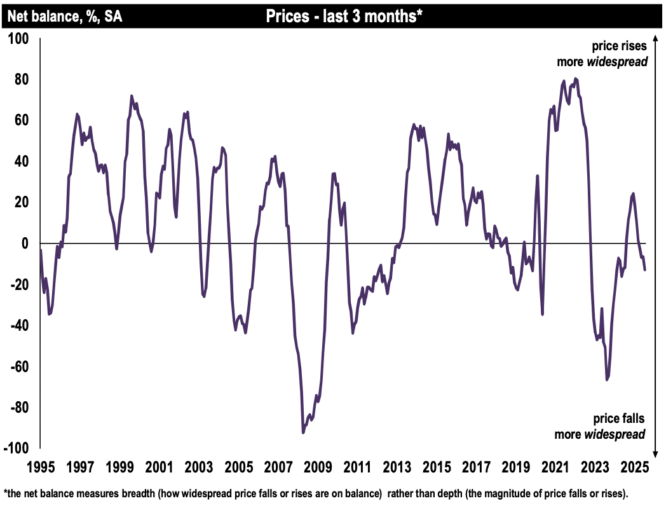The UK housing market’s fragile recovery faltered in July as higher borrowing costs and economic uncertainty pushed buyer demand and sales back into decline according to the latest Royal Institution of Chartered Surveyors (RICS) survey.
New buyer enquiries slipped into negative territory with a net balance of -6%, down from +4% in June, while agreed sales fell more sharply to -16% from -4%.
The slowdown was most acute in East Anglia, the South East and South West although parts of the North West, Northern Ireland and Scotland bucked the trend.

The near-term sales outlook has flattened, with a net balance of just +1% expecting any improvement in transactions, down from +7% in June.
Over a 12-month horizon sentiment is brighter with +8% forecasting growth.
Supply saw a modest uptick, with +9% reporting more new listings. However, prices slipped at the national level, with a net balance of -13%, the weakest since early spring, while East Anglia recorded the steepest falls.
RENTAL MARKET
In the rental market, tenant demand cooled to +4%, down from +14% in the previous quarter but landlord instructions plunged to a net balance of -31%, the lowest since April 2020.
The shortage of supply is expected to drive rents higher over the next three months, with +25% of respondents predicting increases.
ONGOING CHALLENGES

Simon Rubinsohn, RICS Chief Economist, said: “The somewhat flatter tone to the feedback to the July RICS Residential Survey highlights ongoing challenges facing the housing market.
“Although interest rates were lowered at the latest Bank of England meeting, the split vote has raised doubts about both the timing and extent of further reductions.
“Meanwhile, uncertainty about the potential contents of the Chancellor’s autumn budget is also raising some concerns. Against this backdrop, respondents continue to report that the market remains particularly price sensitive at the present time.”
INDUSTRY REACTION

Tomer Aboody, director of specialist lender MT Finance, said: “Lower mortgage rates have helped fuel confidence among those looking to take a step onto, or move up, the housing ladder.
“However, further rate cuts are needed to encourage further activity. Transaction numbers are lower than in previous years as a result of higher stamp duty and taxes imposed by the Chancellor in her last budget.
“Sales numbers need to improve as this will benefit the wider economy, not just the housing market. Some encouragement is required via a reform in stamp duty to encourage those moving up the ladder, as well as those downsizing, to take the plunge.”
GUESS THE TAX RISE

Tom Bill, head of UK residential research at Knight Frank, said: “The housing market is hitting a series of hurdles this year.
“April’s stamp duty cliff edge was the first and now buyers and sellers are increasingly unsettled by a re-run of last year’s game of ‘guess the autumn tax rise’.
“We had an interest rate cut this month but it was priced in and the wider economic mood remains fragile. Supply still notably outstrips demand, which is also keeping a lid on prices.”
“[As to rentals] supply is shrinking as more landlords explore a sale due to tax and regulatory changes in the lettings sector.
“It is one unintended consequence of the forthcoming Renters Rights Bill, which could make it more onerous to regain possession of a property and raises the risk of void periods. As a result, we have seen renewed upwards pressure on rental values in recent months, which will be unwelcome news for tenants.”
REALISTIC PRICING NEEDED

Jeremy Leaf, north London estate agent and a former RICS chairman, says: “Only some vendors are recognising the need for realistic pricing in order to attract attention in view of stock overload, with much of it overpriced, particularly smaller one- and two-bed flats and larger houses.
“Agreed sales are mostly holding supported by falling mortgage rates and a stable employment environment.
“We noticed that [lettings] demand has dropped over the past month or so especially for two-bed flats in older buildings, with more interest in modern, lower maintenance properties. Landlord rent expectations are often elevated although they are starting to become more flexible on pricing even though we are finding that fewer are wanting to sell.”



